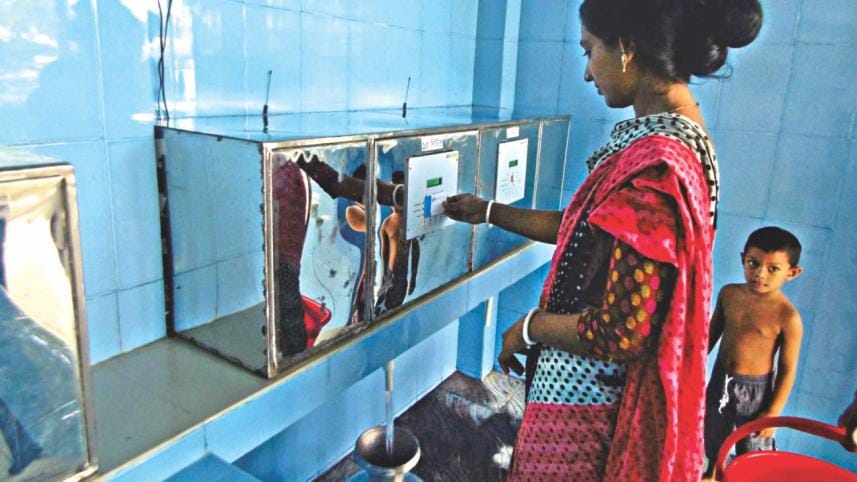Precious water for people in need

Even three months ago, Josna Biswas of Chalna municipality in Khulna's Dakop upazila had to walk 1.5km twice a day to fetch two pitchers of water from the municipality pond.
High salinity in surface and groundwater had become a major problem in her area.
On days when she could not collect water, her husband, Prodip Biswas, would ask local traders heading towards Khulna city, some 40km from Chalna Bazar, to bring water for them.
A jar of water would cost them Tk 50 and they had to pay additional Tk 20 to the traders for bringing the water.
Given the acute crisis of drinking water, the three-member family had to drink in small amounts. But whenever any relative visited their house, the couple would get worried.
Josna's struggle for and worries about water came to an end with the setting up of a groundwater treatment plant on the municipality premises earlier this year.
“I no longer worry about drinking water. Now I collect water with my card from the municipality office. All I need to do is swipe a card on the machine. I can get 15 litres at one go,” the 26-year-old woman told The Daily Star on Sunday.
“It's just a few steps from my house. I pay only 40 paisa for a litre of water. When I first used the machine, I was little confused. But it's very easy to operate,” Josna said with a smile.
To provide drinking water at a low price to small groups of people, Rupantar, a local non-government organisation, in association with WaterAid, Bangladesh, and Hongkong Shanghai Banking Corporation Ltd (HSBC) set up vending machines on the municipality compound in January this year.
The machines dispense around 8,000 litres of water a day through three booths. The booths have the capacity to dispense 10, 15 and 30 litres of water per transaction. It opens at 8:00am and closes at 8:00pm.
The total cost of the project was Tk 31 lakh. The municipality had provided Tk 7 lakh to construct the building that houses the plant, said Zahidur Rahman, project manager of Rupantar.
Some 210 families have so far been given the ATM like cards. The municipality authorities have a plan to provide the service to 600 families, he said.
Using the card, a person can get 3 litres of water a day. He or she will also be able to collect water for his or her family members.
For example, a person with a four-member family will get 12 litres a day, which means the family will get a total of 360 litres of water a month. The person can take as many litres as possible a day until his quota of 360 litres is exhausted, the project manager explained. The person then needs to refill his card to collect water again.
However, during the summer, the amount of water is increased to 4 litres per person, he said.
Asked how a family would get a card, municipality Mayor Sanat Kumar Biswas said any member of a family could get a card after submitting an application to the municipality office. The person needs to provide a copy of his or her voter ID card, a passport size photo, a recommendation letter from the local ward concerned and pay Tk 200.
He said the municipality office would verify the documents and then issue the card. The validity of a card expires in 90 days unless it is refilled.
Tk 100 is for the issuance of the card while the rest Tk 100 is needed for card activation. However, a card can be refilled with up to Tk 999 a month, the mayor said.
Forty paisa per litre is charged each time the card is swiped, he said.
According to Sanat, this is the first community-based water treatment plant with vending machines in the country.
“We are selecting families after verifying their application. The amount we charge is for repairs and maintenance of the plant,” he added.
Amirul Sheikh, caretaker of the building, said he was happy to be a part of the project.
“Apart from keeping the place clean and maintaining queues, I help people who face difficulties in using the machine,” he said.
Sources in the Department of Public Health Engineering in Dakop said there were some 46 government ponds in the upazila and many of them had dried up. Only two ponds had been dug up recently to meet the need of drinking water. Besides, more than 810 shallow tube-wells were set up in the upazila but there was no deep tube-well.
People in the upazila have been facing the crisis of drinking water for years, as it is a saline-prone area. Saline water has intruded into rivers and other water bodies, affecting thousands of people.




 For all latest news, follow The Daily Star's Google News channel.
For all latest news, follow The Daily Star's Google News channel.
Comments